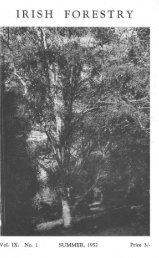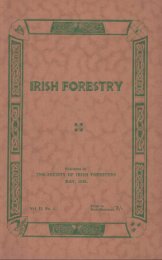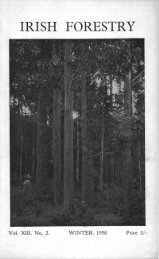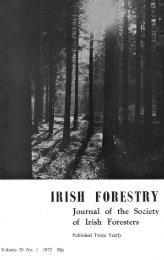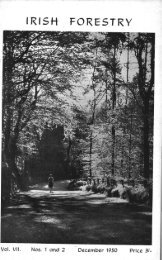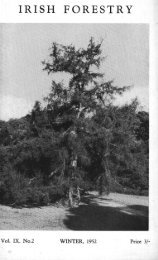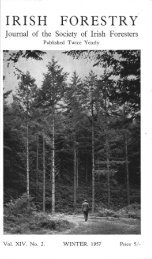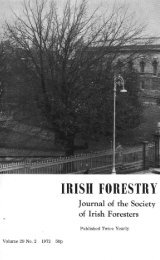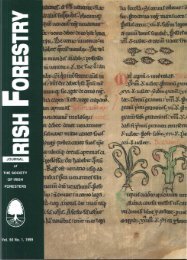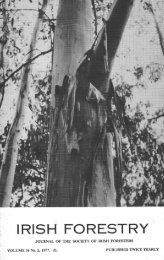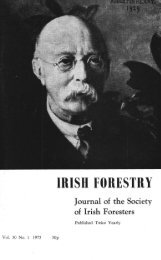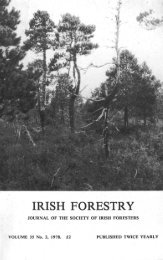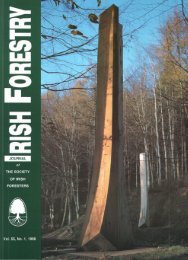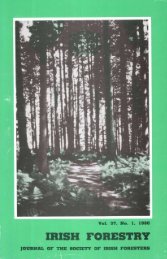Download Full PDF - 28.68 MB - The Society of Irish Foresters
Download Full PDF - 28.68 MB - The Society of Irish Foresters
Download Full PDF - 28.68 MB - The Society of Irish Foresters
Create successful ePaper yourself
Turn your PDF publications into a flip-book with our unique Google optimized e-Paper software.
120 NOTES AND NEWS<br />
Augustine Henry Meeting<br />
On 7th November 1980, in University College, Dublin, a meeting<br />
was held to mark the fiftieth anniversary <strong>of</strong> the death <strong>of</strong> Augustine<br />
Henry, born on 2nd July 1857 in Dundee, Scotland, studied at the<br />
university colleges in Galway and Belfast, before joining the<br />
Chinese Maritime Customs Service in 1881. While in China he<br />
made a remarkable contribution to the exploration <strong>of</strong> the Chinese<br />
flora. On his retirement from the Service, he went in 1903 to Nancy<br />
to study forestry, but soon abandoned that in favour <strong>of</strong> working<br />
with H. J. Elwes on Trees <strong>of</strong> Great Britain and Ireland. Later Henry<br />
became the first Reader in Forestry at the University <strong>of</strong> Cambridge,<br />
and in 1913 accepted the chair <strong>of</strong> forestry in the Royal College <strong>of</strong><br />
Science in Dublin (later University College, Dublin). He died on<br />
23rd March 1930.<br />
H. M. Fitzpatrick spoke on Henry's return to Ireland as Pr<strong>of</strong>essor<br />
<strong>of</strong> Forestry and Miss Sheila Pim, Henry's biographer, read a paper<br />
on his associations with the Dun Emer Press, one <strong>of</strong> the features <strong>of</strong><br />
the Celtic revival early this century. Dr. J. Durand recalled Henry's<br />
influence on forestry in Ireland and J. o 'Driscoll paid tribute to his<br />
work in plant breeding. Dr. C. Nelson explained Henry's influence<br />
on the exploration <strong>of</strong> the Chinese flora and the introduction <strong>of</strong><br />
Chinese plants into European gardens.<br />
<strong>The</strong> meeting, jointly sponsored by this society, the Forestry<br />
Graduates Group <strong>of</strong> the Agricultural Science Association, and by<br />
the <strong>Irish</strong> section <strong>of</strong> the <strong>Society</strong> for the Bibliography <strong>of</strong> Natural<br />
History was well attended and was a small tribute from <strong>Irish</strong><br />
foresters, botanists and horticulturists to a man whose influence is<br />
still tangible in our landscape and gardens.<br />
C. Nelson.<br />
Another Alternative Energy Source<br />
Methane gas produced from farmyard manure can wholly replace<br />
fuel oil for heating and hot-water purposes on a medium-sized farm,<br />
according to a report from the National Swedish Industrial Board<br />
which has subsidised research into the question. With the Board's<br />
encouragement a Swedish farmer, aided by students from<br />
Gotenburg University, installed such a system on his farm and it has<br />
worked so effectively that no oil has been used there for heating or<br />
hot water production since March <strong>of</strong> last year.<br />
<strong>The</strong> system provides for the manure to be pumped into a<br />
hermetically sealed container with a capacity <strong>of</strong> 90 cubic metres.<br />
<strong>The</strong> manure remains there for 20-30 days at a temperature <strong>of</strong> 35°C,<br />
at which point the methane bacteria become active and produce<br />
gas. A pump is used to stir the manure for 5 minutes each day to<br />
prevent stratification. Daily gas production in the tank is some 80



